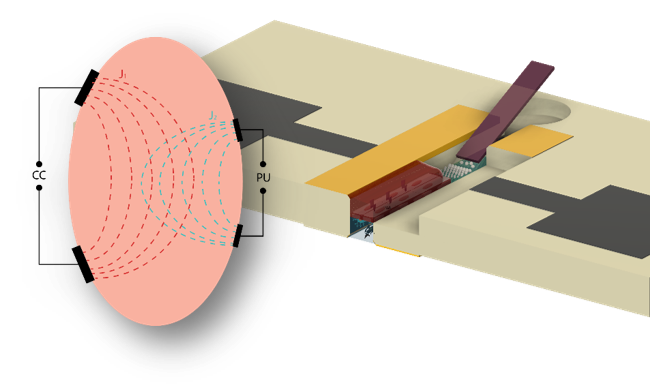MSc thesis project proposal
On-chip tissue barrier impedance sensor
The blood-brain barrier (BBB) is one of the most important barriers in human physiology. The BBB protects the central nervous system and the brain from toxic compounds, and ensures a homeostatic environment while also satisfying the brain's high glucose demand. Dysfunction of the BBB is evident in neuro-degenerative diseases. For this reason and to test potential therapeutics, it is important to quantitatively measure the barrier function and integrity in vitro. Organ-on-chip technology can be a suitable vehicle for the purpose.
A widely used method for BBB integrity monitoring is transepithelial / transendothelial electrical resistance measurement (TEER), either by using ohmic resistance or impedance spectroscopy. This readout is a measure of the paracellular conductivity and thus gives an estimate of the permeability of the cell layer. However, ion concentration in culture medium affects the accuracy of the measurements, and lowers the signal-to-noise ratio. Additionally, the design of the electrodes needs to be optimized for uniform current density, which also and largely affects the accuracy of the measurements.
The aim of this project is to design an on-chip impedance measurement device for BBB activity, by investigating the integration of electrodes on both sides of a porous membrane supporting tissue co-culture. The close proximity of electrodes and cells is expected to reduce noise from the medium and thus yield more accurate and sensitive impedance measurements.
Assignment
This experimental project will involve:
- An extensive review of the related state-of-the-art;
- Designing and optimization of the on-chip impedance spectroscopy device;
- Microfabrication of the proposed solution(s);
- Characterisation of sensor and monitoring the integrity of the BBB;
- Reporting.
Daily advisor: Pratik Tawade
Requirements
You are an ambitious hands-on master student from microelectronic, mechanical or biomedical engineering, materials science or (applied) physics. You have good communication skills in English, you are independent and also a team player. The graduation project will have a total duration of 9 to 12 months.
If you are eager to work in a motivating atmosphere with highly skilled colleagues, then send us your CV!
Contact
dr. Massimo Mastrangeli
Electronic Components, Technology and Materials Group
Department of Microelectronics
Last modified: 2024-03-25
